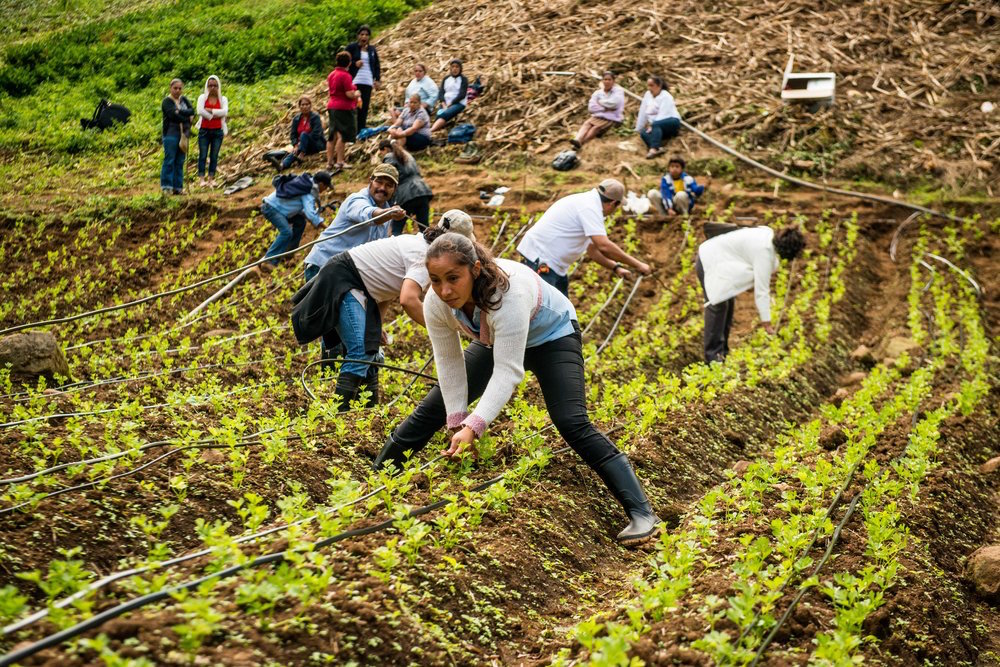
Asociación Proyecto Aldea Global is an association of small-scale coffee producers from the region of Jinotega in Nicaragua, where the “Coffee Landscapes and Assessment” project will take place. SAFE Platform photo by Opmeer Reports for Oikocredit.
The Sustainable Agriculture, Food and Environment (SAFE) Platform has announced the introduction of four new coffee-related development projects in Latin America, representing a total investment of $3.2 million.
With numerous individual stakeholders, financiers, implementors and coffee communities involved in each of the projects, it’s a lot to keep track of, yet each of the individual projects are noteworthy with proclaimed commitments to important topics such as gender equity, youth engagement and farmer empowerment through practical means.
We’ll do our best to break it all down here:
The SAFE Platform
First, the SAFE Platform is described as a “multi-stakeholder alliance” initiated by the Multilateral Investment Fund (MIF, or FOMIN in Spanish). MIF is part of the Inter-American Development Bank (IDB) and primarily provides finances to groups, often NGOs, working to expand access to finance and markets to small businesses in Latin America and the Caribbean.
The Platform is managed by the Dutch international development organization Hivos, and it was also co-founded and is additionally funded by its 16 members, including various NGOs, nonprofits and private entities. (Private partners include Starbucks, Ecom Trading, Keurig Green Mountain, Farmer Brothers and S&D Coffee & Tea.)
The Platform’s stated goal is to leverage the existing knowledge, expertise and resources to implement projects that either pilot or scale up innovative approaches to the value chain. Its projects to this point have been primarily focused in Latin America and on the coffee sector.
There are currently six individual projects under the SAFE Platform umbrella. To make things even more complicated, each project falls into one of two Platform categories: individual projects (think core projects) and “small interventions (think complementary projects).”
Still with us? Good. Here are some details on the SAFE Platform’s four new projects, the first being an “individual project” and the other three being “small interventions.”
Price Risk Management for Coffee Cooperatives in Latin America
What: Its main purpose is to promote a unique and integral strategy that includes the development of a price risk management (PRM) toolkit, and access to financial resources.
Who: Executed by the Oikocredit International Support Foundation (ISUP), in partnership with Catholic Relief Services, Keurig Green Mountain and Fair Trade USA. The initiative is targeted to over 16 beneficiary cooperatives from Honduras, Guatemala, Nicaragua, Colombia, and Peru — including approximately 5,000 farmers.
How: The project is divided into four working components: organizational strengthening, a PRM toolkit, a peer-to-peer learning apprenticeship program, and options financing.
From the SAFE Platform: “Based on a pre-assessment of each co-op’s PRM capacities, it seeks to transform the following over a three-year period: co-op profitability, credit-worthiness, and competitiveness.
Climate Smart Coffee and Responsible Sourcing
What: This initiative aims to integrate climate resilience, traceability and sustainability into the supply chains of 1,500 smallholder farmers from the Santa Rosa region of Guatemala.
Who: Hanns R. Neumann Stiftung North America (HRNS NA), in tandem with roasters and coffee traders.
How: Value chain and organizational development, climate-smart coffee systems development, and strategic dialogue and institutional learning.
From the SAFE Platform: “The long-term goal is for coffee production to be an economically viable, environmentally sustainable, and climate-change resilient livelihood activity for smallholder farming households in Guatemala and the Central American region as a whole.”
Coffee Landscapes and Assessment Project
What: To design and pilot a holistic assessment framework for coffee landscapes.
Who: Conservation International (CI) and the Committee on Sustainability Assessment (COSA) propose to work together with the members of the Coalition for Coffee Communities (CCC) to develop a landscape assessment framework that combines cooperative, household and remote sensing analyses to measure progress made by the coffee sector in driving socio-economic development of communities and ecological conservation at the landscape level.
How: Three separate pieces: landscape accounting, household and producer organization surveys, and environmental monitoring. Together, all of these factors combine to increase the likelihood that a farmer will be successful and have the necessary quality of life to continue producing at a reasonable cost.
From the SAFE Platform: “The goals of the project are twofold: first, to develop an assessment approach to coffee landscapes that can be taken up and replicated across the sector; and second, to identify and align on strategic investments the CCC members can undertake individually and collaboratively in Jinotega, Nicaragua, by applying the assessment approach.”
Gender Equity in Coffee Value Chains
What: Identify and spearhead the design and testing of a validated systematic approach to a more resilient coffee supply chain by improving gender equity at origin.
Who: the Partnership for Gender Equity (PGE), a strategic research and development initiative of the Coffee Quality Institute (CQI), aims to leverage support from industry partners to work at the community level. The area outlined is Northwestern Nicaragua (Estelí, Nueva Segovia, and Madriz), with approximately 4,000 direct beneficiaries.
How: PGE will create a packaged and tested design for gender equity investment and intervention, and a validated measurement framework. The measurement framework and gender indicators are built on existing measurement systems and can be integrated into PGE project design, COSA’s measurement framework, or other performance monitoring systems.
Nick Brown
Nick Brown is the editor of Daily Coffee News by Roast Magazine.






Comment